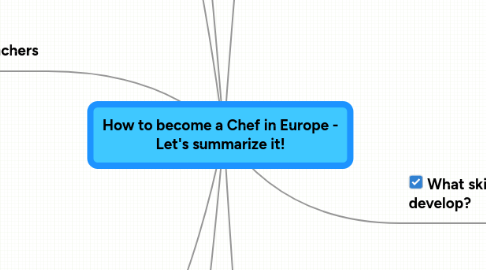
1. Participants
1.1. active till the end
1.1.1. Bulgaria
1.1.2. Czech Republic
1.1.3. France
1.1.4. Germany
1.1.5. Italy
1.1.6. Poland
1.1.7. Sweden
1.2. temporary participants, opted out due to work load
1.2.1. Belgium
1.2.2. Spain
1.2.3. Hungary
2. What did students dislike about the project?
2.1. little time for the project work
2.2. when Twinspace was down
2.3. IT problems at school/bandwidth/no internet access
2.4. that they had to remember their login data for the Twinspace
2.5. patience needed waiting for partner students' contributions
2.6. our schedule did not always work to our benefite to coincide with our partners timetable, specially when there where web based conferences
3. Benefits for the teachers
3.1. pan-European collaboration with enthusiastic colleagues
3.2. change from the typical way of teaching Chef students in English
3.3. exchange of teaching material in 'staff room' of Twinspace
3.4. lots of fun
3.5. "thinking outside of the box"
3.6. project motivated students more than the usual English classes
3.7. improving one's own ICT literacy
3.8. getting to know your students better
3.9. learning new things
3.10. Making other teachers aware of eTwinning in our respective schools
3.11. meeting new colleagues
3.12. opening new doors for future collaboration
4. Problems for the teachers
4.1. enormous work load
4.2. organising project work (PC labs etc.)
4.3. coping with different levels of ICT literacy on student side (apart from teaching matter English itself)
4.4. managing to coincide my time with the projects
5. Prizes won so far
5.1. National Quality Labels
5.1.1. Czech Repbulic
5.1.2. France
5.1.3. Germany
5.1.4. Italy
5.1.5. Poland
5.1.6. Sweden
5.2. European Quality Labels
5.2.1. Czech Repbulic
5.2.2. France
5.2.3. Germany
5.2.4. Italy
5.2.5. Poland
5.3. National eTwinning Awards
5.3.1. Czech Repbulic
5.3.2. France
5.3.3. Germany
5.3.4. Italy
5.3.5. Poland
5.4. Others
5.4.1. European Language Label by the "Common Conference of the Ministers of Education and Cultural Affairs of Germany, Austria and Belgium"
6. What did students like about the project?
6.1. exchange with peers in the same professional situation in a foreign country
6.2. telling/showing others about their workplaces/schools etc. (image gallery in pupils' corner)
6.3. break from usual 'English for Chefs' routine
6.4. working with the PC
6.5. applying language naturally
6.6. comparing one's own situation with that of others
6.7. Czech students: presenting project on miniconference in Přerov
6.8. German students and Polish student: invitation to DIDACTA educational fair, presenting the project
6.9. Doing something different from the norm
7. What skills did they develop?
7.1. intercultural skills
7.1.1. getting to know different systems of professional education of Chefs in Europe
7.1.2. intercultural awareness
7.1.3. socialising with peers in other countries
7.1.4. getting an insight of what it will be like to work as a Chef in another European country
7.2. foreign language skills
7.2.1. socialising language
7.2.2. talking about oneself, hobbies, dreams for the future etc.
7.2.3. asking questions
7.2.4. work-related terminology (describing the workplace, subtitling their kitchen photos in image gallery)
7.2.5. narrative/descriptive language (presenting typical national/regional specialities in English
7.2.6. vocabulary for new ingredients
7.2.7. recipe language (presenting recipes of the the newly created dishes)
7.2.8. using online dictionaries and language forums
7.3. ICT skills
7.3.1. PowerPoint presentations
7.3.2. Flashmeeting - online video conferencing
7.3.3. independent work in Twinspace (some students were pupil admins)
7.3.4. working with photos (uploading, downsizing)
7.3.5. some: video editing
7.3.6. researching on ingredients/specialities/recipes
7.4. personal skills
7.4.1. working successfully in a team
7.4.2. reflecting upon one's own life/future plans etc.
7.5. professional skills
7.5.1. practical skills
7.5.1.1. preparation, mise en place
7.5.1.2. cooking the dishes
7.5.1.3. arranging/presenting the dishes appropriately
7.5.2. organisational skills
7.5.2.1. creating the new dishes
7.5.2.2. planning the cooking process
7.5.2.3. organising work in kitchen
7.5.2.4. buying the necessary supplies on budget
7.5.2.5. team work
7.5.2.6. cleaning up etc.
7.5.2.7. doing research on unknown ingredients
7.5.3. communicational skills
7.5.3.1. English has long since outpaced French as the language in internationally run kitchens
7.5.3.2. preparing oneself for employment in unifying European labour market
7.5.4. skills needed in the final exams: creating/planning/cooking/presenting dishes from given ingredients
